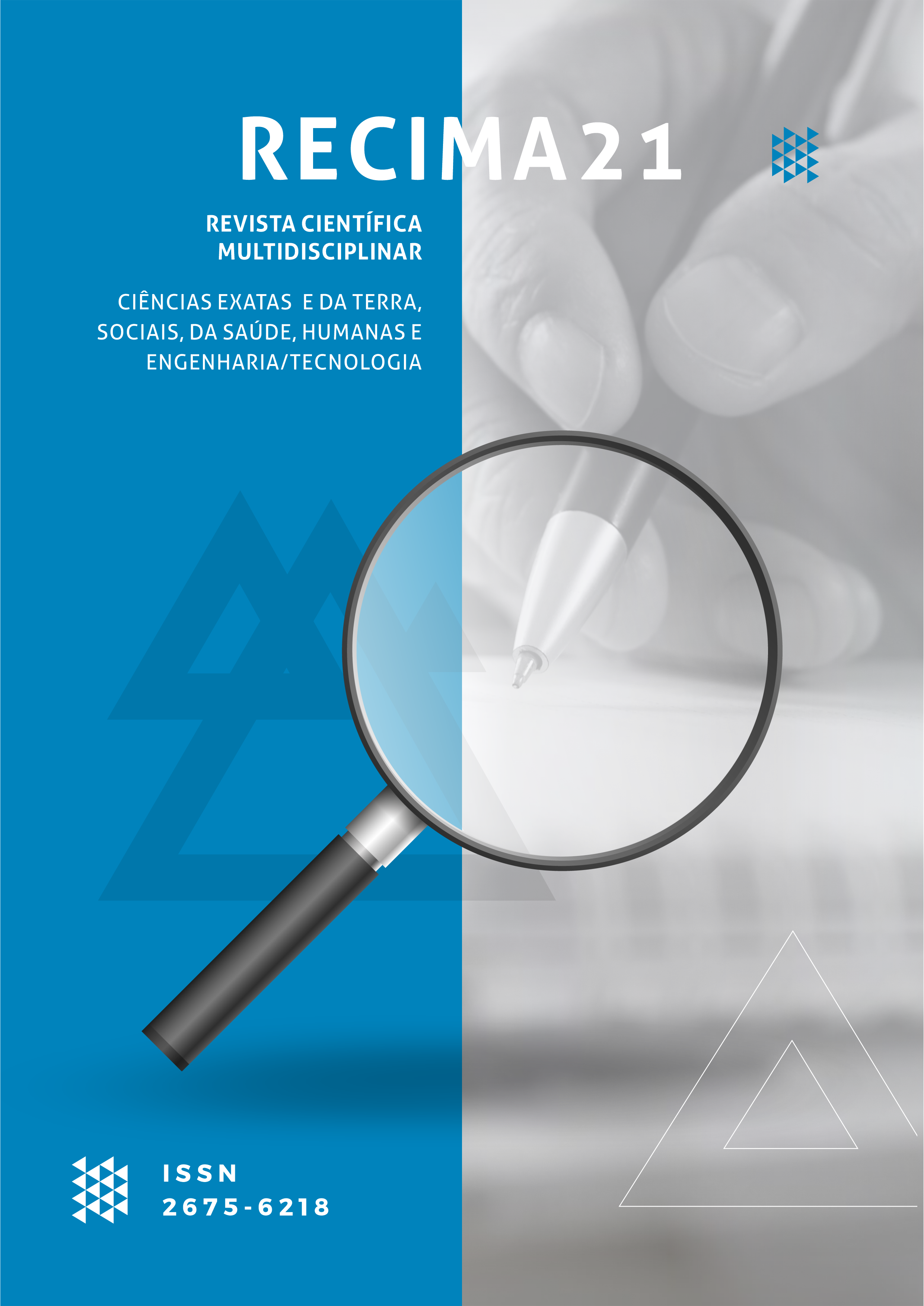PEDAGOGIC ACTIVITIES FOR STIMULATION OF CHILDREN WITH LEARNING DIFICULTY IN THE CONTEXT OF EARLY CHILD EDUCATION: SCOPE REVIEW PROTOCOL
DOI:
https://doi.org/10.47820/recima21.v3i12.2291Keywords:
Early childhood education, Early childhood education Education special, Early educational interventionAbstract
Objective: Map publications about pedagogical activities indicated for stimulation of children with learning difficulties in the context of Early Childhood Education. Method: Scope review protocol, based on the Joanna Briggs Institute (JBI) manual and conducted according to the Prefered Reporting Items for Systematic Review and Meta-Analyses - Extension for Scoping Reviews (PRISMA-ScR) checklist. The research question that will guide this study will be: “What are the pedagogical activities indicated for the stimulation of children with learning difficulties in the context of Early Childhood Education?”. All types of study designs will be included. There will be no date and language restrictions in the search strategy to be carried out. An advanced search strategy in databases will be developed, using the PCC strategy. The electronic databases included will be: MEDLINE, via PubMed; Electronic Journals in Psychology (PEPSIC), Scientific Electronic Library Online (SciELO); Latin American Caribbean Literature on Health Sciences (LILACS), via the Virtual Health Library (VHL). The portal of journals Capes, Academic Google, institutional repositories of dissertations and theses and government websites will be consulted, composing the gray literature of the research. The selection of studies will be carried out by two researchers. In case of discrepancy, a third researcher will be consulted. The Intelligent Systematic Review – Rayyan software will be used to enable the selection of analysis of studies retrieved from the databases. Finally, the results will be presented in a descriptive way.
Downloads
References
Brasil. Ministério da Educação. Secretaria de Educação Básica. Diretrizes curriculares nacionais para a educação infantile. Ministério da Educação; 2010.
Souza PR, Coelho JPP. Aspectos legais da educação infantil no brasil e as políticas de financiamento. Colloquium Humanarum. 2018 [citado 2022 nov 08]; 15(2). Disponível em: https://journal.unoeste.br/index.php/ch/article/view/2409.
Brasil. Ministério da Educação. Diretrizes curriculares nacionais para a educação infantile. Secretaria de Educação Básica. MEC; 2010.
Araújo EDAR. “Uma Escola Inclusiva em busca da superação de seus desafios: interlocução com sujeitos e território em tempos de pandemia”. Projeto Político Pedagógico. 2021.
Brasil. Ministério da Educação. Base Nacional Comum Curricular. Educação é a base. Ministério da Educação; 2017.
Fochi PS. A complexa sutileza da ação pedagógica com bebês. In: Pereira ACC. Atravessamentos: Ensino – Aprendizagem de arte, formação do professor e educação infantile. Escola de Belas Artes, Universidade Federal de Minas Gerais; 2015.
Araújo MC, Boo FL, Novella R, Schodt S, Tome R. The Quality of Centros Infantiles del Buen Vivir in Ecuador. Inter-American Development Bank; 2015. DOI: http://dx.doi.org/10.13140/RG.2.1.4277.6722.
Rotta NT, Ohlweiler L, Riesgo RS. Transtornos da Aprendizagem – abordagem neurobiológica e multidisciplinar. Artmed; 2006.
Souza EMC, Teixeira SPC. Neuropedagogia e suas contribuições para a psicopedagogia frente à aprendizagem com seus problemas. Seminário Gepráxis. 2017 [citado 2022 nov 08]; 6(6):1040-56. Disponível em: http://anais.uesb.br/index.php/semgepraxis/article/view/7271.
Mantoan, Maria Teresa Eglér. Inclusão Escolar: O Que é. Por quê. Editora Moderna, 2003.
Rodrigues LMP. O preconceito, a exclusão escolar e as dificuldades em se praticar efetivamente a Educação Inclusiva. Revista Científica Multidisciplinar Núcleo do Conhecimento. 2006 [citado 2022 nov 08]; 2(13):135-47. Disponível em: https://www.nucleodoconhecimento.com.br/educacao/o-preconceito
Lima RF, Salgado CA, Ciasca SM. Atualidades na Dislexia do Desenvolvimento. Revista Psique 2009; 38: 22-9. 13. Oliveira ZMR. Rediscutindo a natureza do ensino. In: Escola Básica. CEDES/ANPEdlANDE.Papiros; 1992.
Rodrigues SA, Garms GM. Z. Intencionalidade da ação educativa na educaçao infantil: a importância da organização do tempo e do espaço das atividades. Nuances: Estudos sobre Educação, Presidente Prudente. 2010; 14(15). DOI: 10.14572/nuances.v14i15.161.
Bernardes MEM. Mediações simbólicas na atividade pedagógica: contribuições da teoria histórico-cultural para o Ensino e a aprendizagem. CRV; 2012.
Umbelino JD. Elementos mediadores na atividade pedagógica promotora do desenvolvimento humano na criança: contribuições da educação em Cuba. Universidade Federal de Santa Catarina; 2014.
Murray L, Jennings S, Mortimer A, Prout A, Melhuish E, Hughes C, et al. The impact of early-years provision in Children's Centres (EPICC) on child cognitive and socio-emotional development: study protocol for a randomised controlled trial. Trials. 2018; 19(1):450. DOI: 10.1186/s13063-018-2700-x.
Moody AK, Justice LM, Cabell SQ. Electronic versus traditional storybooks: Relative influence on preschool children’s engagement and communication. Journal of Early Childhood Literacy. 2010; 10: 294–313. DOI: https://doi.org/10.1177/1468798410372162.
Morgan B, D’mello S, Radvansky G, Haass M, Tamplin A. Individual differences in multitasking ability and adaptability. Human Factors. 2013; 55:776–788. DOI: 10.1177/0018720812470842.
Esterman M, Rosenberg MD, Noonan MD. Intrinsic Fluctuations in Sustained Attention and Distractor Processing. The Journal of Neuroscience: The Official Journal of the Society for Neuroscience. 2015; 34(5):1724-30. DOI: 10.1523/JNEUROSCI.2658-13.2014.
Peters MDJ, Godfrey C, Mclnerney P, Soares C, Khalil H, Parrker D. Joanna Briggs Institute Reviewer's Manual. In: Aromataris E, Munn Z. Joanna Briggs Institute Reviewer's Manual. Joanna Briggs Institute; 2017 [citado 2022 nov 08]. Disponível em: https://reviewersmanual.joannabriggs.org/.
Tricco AC, Lilie E, Zarin W, O’brien KK, Colquon H, Lavac D, et al. PRISMA Extension for Scoping Reviews (PRISMA-ScR): Checklist and Explanation. Ann Intern Med. 2018; 169:467-473. DOI: 10.736/M18-0850.
Aromataris E, Munn Z. JBI manual for evidence synthesis. Adelaide: The Joanna Briggs Institute; 2020. DOI: http://dx.doi.org/10.46658/JBIMES-20-01.
Araújo WCO. Recuperação da informação em saúde: construção, modelos e estratégias, Convergências em Ciência da Informação. 2020; 3(2):100-34. DOI: https://doi.org/1033467/conci.v3i2.13447
Ouzzani M, Hammady H, Fedorowicz Z, Elmagarmid A. Rayyan: a web and mobile app for systematic reviews. Syst Rev. 2021 [acessado 2022 set 7]; 5(1):210-20. DOI: https://doi.org/10.1186/s13643-016-0384-4.26.
Downloads
Published
Issue
Section
Categories
License
Copyright (c) 2022 RECIMA21 - Revista Científica Multidisciplinar - ISSN 2675-6218

This work is licensed under a Creative Commons Attribution 4.0 International License.
Os direitos autorais dos artigos/resenhas/TCCs publicados pertecem à revista RECIMA21, e seguem o padrão Creative Commons (CC BY 4.0), permitindo a cópia ou reprodução, desde que cite a fonte e respeite os direitos dos autores e contenham menção aos mesmos nos créditos. Toda e qualquer obra publicada na revista, seu conteúdo é de responsabilidade dos autores, cabendo a RECIMA21 apenas ser o veículo de divulgação, seguindo os padrões nacionais e internacionais de publicação.













